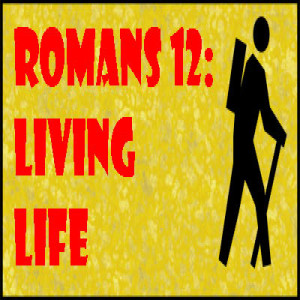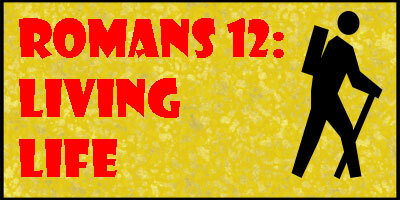
G’day and welcome to Partakers Christian Podcasts! Join us for uplifting Bible teaching, inspiring readings, heartfelt worship, powerful prayers, and fascinating church history. Whether you’re new to faith or growing deeper in your journey, we’re here to encourage and equip you. 🎧 Tune in, interact, and be inspired—wherever you are in the world.
Episodes

Tuesday Sep 26, 2023
Romans 12 - Living Life - Part 26
Tuesday Sep 26, 2023
Tuesday Sep 26, 2023

Romans 12: Living Life
Study 26: Be honourable
As we saw in our last study, we are not to pay back evil with yet more evil. We are to retaliate against others with love to those who would wish us harm. We are to behave in such a way that we are above and beyond reproach – that is being criticized for our behaviour! That is what Paul means by honourable here. We are to refrain from doing what is evil and wrong but we are also to do what is right.
As Christians we are to act in such a way the people will ask the reason why we are so different. They will ask why you do what you do – particularly if you do the things that Paul has been talking about in this chapter! You will be seen to be living a life of honour which reflects your relationship with God. As you do this you show to others that you are a Christian – a child of God – who is in an exciting and dynamic relationship with God. People will ask why are you so different from us – giving you honour! But not only that, even if they are atheist or agnostic, they will be giving honour to God because you are His child.
Can you imagine if more people took seriously what Paul is writing here in Romans 12? The world would be turned upside down and a revolution would be in evidence! Not a revolution borne from violence but a revolution of loving God and loving others! That is what the Church is supposed to be like – harmonious communities of Christians proclaiming that they love God and showing that they do that by loving other people. Christians doing things which bring praise and honour to God and people outside the Church remarking how honourable they are! Imagine!
Can it be done? Yes! If we as Christians asked the Holy Spirit to help us as He empowers us!
Go! Live your life in such a way, that you are seen as honourable and therefore the God you claim to love is also honoured. Ask the Holy Spirit to help you – He will help if you ask!
Right Mouse click or tap here to save this Episode as an audio mp3 file

Monday Sep 25, 2023
Romans 12 - Living Life - Part 25
Monday Sep 25, 2023
Monday Sep 25, 2023

Romans 12: Living Life
Study 25:
v17 Never pay back evil with more evil.I wonder if you have ever been hurt by somebody else. I know that I have. I also know that not only have I been the victim, I have also been the one to inflict and hurt others. So how are we to respond to those who would wish us harm? After all, we are commanded to love those people.
Paul here commands that we don’t pay back evil for evil. That will just perpetuates a circle of evil in our life and prove to be a distraction from living a life that is honouring to God – living a life of worship and devotion to Him.
What does this mean in practise? We know we are to love our enemies. Jesus taught it and Paul also. We are to do good to everyone, including those who are against us. We are to actively bless our enemies and repay that way! WOW! That goes against our culture, which usually dictates either at best to ignore or at worst to retaliate!
Our natural reaction, if we are honest, is to retaliate against others. Either with evil against the perpetrator or by simply just ignoring them. But that is not what Paul suggests! We are to desire to win them over for the glory of God! WOW! Let us as members of His Church retaliate that way. We are to show mercy and forgiveness to those who would harm and hurt us in anyway - – physically, spiritually, emotionally or mentally. After all, God has done that to us through Jesus Christ despite all we have done against Him! If He can do it, so can we!
Remember, as Christians we have the Holy Spirit living within us! How easily we forget to ask Him to help us do things what humanly speaking seems impossible – including repaying evil with good. People maybe able to harm our bodies but they can never harm us spiritually. Sometimes those within the Church, including the Church we regularly attend, seek to harm us in some way. Let us win them over too – for the sake and glory of God! We also need to seek forgiveness of those we have done wrong as well as forgiving those who have wronged us? Again, this is possible when done using the power of the Holy Spirit.
Go! Do good to all, bless them, forgive them if necessary – including those who would seek you harm.
Right Mouse click to save this Episode as an audio mp3 file
Click on the appropriate link below to subscribe, share or download our iPhone App!
Sunday Sep 24, 2023
Romans 12 - Living Life - Part 24
Sunday Sep 24, 2023
Sunday Sep 24, 2023

Romans 12: Living Life
Study 24: Humility of mind and spirit
Here are two of the main reasons that churches lack harmony – pride and know-it-alls!! Do you think that may describe somebody that you know? Or even yourself?
There is to be no place in the Gospel, and therefore the Church itself, for pride and conceit. There is to be no favouritism within the life of the Church. Love does not show favouritism or partiality but love treats all people equally. The best person for the job, is the best person for the job – not the one shown favouritism. That isn’t to say we can’t have some people as friends and others not! But we are not to make differences between people based on things such as bank balances, social status, education, birthplace etc. Let not the educated look down upon the uneducated. Let not the financially rich not look down on the poor & homeless. Let males not look down upon females or females look down on males.
Structure within Churches is important or there would be chaos. Remember a Church is to be harmonious – and those of higher importance in Church structures are to associate & work with those of the least importance in Church structures. Why?
Because of Jesus Christ. Jesus Christ, being the Son of God, made Himself nothing in order to become a human being. Jesus, the Lord of the Church, was willing to do everything possible, so that you and I may be able to become children of God. Jesus Christ, and therefore God Himself, treats equally all sections of society, and so must those who claim to follow Him.
And we all know somebody who is a know-it-all – they have an answer to every question and like to let everybody know that they do! Now it is good to be wise in the ways of God but let not that lead to pride! Such a person is hard to teach – hard even to God. Wisdom comes from studying God’s word, being willing to be changed by the Spirit who lives within all believers without distinction. The so-called uneducated are usually more willing to be wise from this method than the educated.
Go! Be practical in your love of God to all people without partiality or distinction. And don’t think you know it all – coz you don’t!
Right Mouse click or Tap Here to save this Episode as an audio mp3 file
Click on the appropriate link below to subscribe, share or download our iPhone App!
Saturday Sep 23, 2023
Psalm on Demand - Psalm 23
Saturday Sep 23, 2023
Saturday Sep 23, 2023
Psalm 23
1 The LORD is my shepherd,
I shall not be in want.
2 He makes me lie down in green pastures,
he leads me beside quiet waters,
3 he restores my soul.
He guides me in paths of righteousness for his name's sake.
4 Even though I walk through the valley of the shadow of death,
I will fear no evil, for you are with me;
your rod and your staff, they comfort me.
5 You prepare a table before me in the presence of my enemies.
You anoint my head with oil; my cup overflows.
6 Surely goodness and love will follow me all the days of my life,
and I will dwell in the house of the LORD forever!
Right mouse click or tap here to save/download this as a mp3 audio file

Saturday Sep 23, 2023
Romans 12 - Living Life - Part 23
Saturday Sep 23, 2023
Saturday Sep 23, 2023

Romans 12: Living Life
Study 23: Be Harmonious
I can hear you saying to yourself “Yeah right, Paul! Get a life, mate! Me? Live in harmony with that person over there? No way!”
Yet to live in harmony with each other is to be our goal says Paul. If we were loving God and loving others as we ought, in the power of the Holy Spirit who lives within ALL believers in the church community – then believers should be able live in harmony with each other!
As we have seen earlier, any group of believers in one location has spiritual gifts! No gift is more important than the other, yet I know from experience, that some Spiritual Gifts are lifted up more than others! The local church with its people is akin to a human body. Can a foot say it is more important than the brain? No! The brain controls the foot! Can the brain say it is more important then the heart? No! The heart pumps the blood which keeps the brain alive! Can the heart say it is more important than the foot? No! Because without exercise, the heart grows weak! That is what it is like in the church – local, national and worldwide!
To live in harmony is to live in agreement with each other! We are united with other Christians whether want to be or not! We all have the one Spirit living within us. There was only one Cross, therefore there can only be one Kingdom and church. There is only one God, therefore there could only be one people and one church known by its unity. Jesus Christ is the one Great Shepherd and there is only one flock, when referring to Himself and his followers the church (John 10:16).
Unity however does not mean uniformity. With the proviso that core beliefs are maintained, there appears to be room for some digression regarding secondary beliefs (Paul alludes to that in Romans 14:1–15:13). Individual churches have different local needs to be faced, and have therefore dissimilar requirements. Tomorrow we will see one of the main reasons churches don’t have harmony! But for now, go! Do all you can to be harmonious with others and show Church unity to the world!
Right Mouse click or Tap hereto save this Episode as an audio mp3 file
Click on the appropriate link below to subscribe, share or download our iPhone App!
Friday Sep 22, 2023
Romans 12 - Living Life - Part 22
Friday Sep 22, 2023
Friday Sep 22, 2023

Romans 12: Living Life
Study 22: Rejoice and sorrow
I wonder if some times you are like me –you are sad when people you know have reason to be happy! We are like that as people! Jesus in Luke 15:25-30 indicates that this behaviour comes from envy! Or you are happy when people have reason to be sad or in trouble – your attitude is “They deserve it!” This is nothing short of malice. And unsurprisingly, it can come quite naturally to us! Paul here challenges the Roman readers and by proxy, us, with something totally alien to our natural way of behaving! Paul goes “be happy to the happy and weep with the weeping!”
That is a counter to the way the world we live in operates. Sure some people who are not Christian may do it Paul’s way but in general they don’t. But that is not the way it is to be with the Church! We are to love others as we would want to be loved. Love is not detached or ignorant of other people’s joys and sorrows. Love does not simply ignore or bear malice. Love lifts, encourages, embraces and emboldens! Love in action is offering a shoulder to cry on to somebody in need of help. Love in action is rejoicing with that brother or sister who has cause for celebration. Love offers solidarity with the other person, regardless of mood or emotion.
So how can we show this love to others? We maybe able to do it in our own strength, but we assuredly can by using the power of the Holy Spirit! Oh how easily we forget He is living within us! WOW! If we ask for His help, He will help – often in the most amazing ways. Let the Holy Spirit stimulate your imagination as to how you can practically rejoice and be happy with those who are rejoicing or to show you how you can weep with those who are weeping and in sorrow. And if we have reason to rejoice, let us not forget to be so overcome that we neglect to weep with those who are weeping. Or conversely, if we have good reason to be weeping, let us now forget to somehow rejoice with that brother or sister who has reason to be happy!
Go! Let your love for others be practically seen – whether with smiles or with tears!
Tap Here or Right Mouse click to save this Episode as an audio mp3 file
Click on the appropriate link below to subscribe, share or download our iPhone App!
Thursday Sep 21, 2023
Psalm On Demand - Psalm 121
Thursday Sep 21, 2023
Thursday Sep 21, 2023
Psalm 121
121:1 I will lift up my eyes to the hills.
Where does my help come from?
121:2 My help comes from Yahweh,
who made heaven and earth.
121:3 He will not allow your foot to be moved.
He who keeps you will not slumber.
121:4 Behold, he who keeps Israel will neither slumber nor sleep.
121:5 Yahweh is your keeper.
Yahweh is your shade on your right hand.
121:6 The sun will not harm you by day,
nor the moon by night.
121:7 Yahweh will keep you from all evil.
He will keep your soul.
121:8 Yahweh will keep your going out and your coming in,
from this time forth, and forevermore.
Right mouse click or Tap here to save/download this Psalm as a MP3 file

Thursday Sep 21, 2023
Romans 12 - Living Life - Part 21
Thursday Sep 21, 2023
Thursday Sep 21, 2023

Romans 12: Living Life
Study 21: Bless and pray
Paul here seems to have had some teaching about what Jesus taught for here he echoes Jesus, who is now His master. (Matthew 5:43-44 and Luke 6:27-28.)
To bless means to show kindness and love. Do you have enemies – people who don’t like you or loathe you because you are a Christian or for some other reason? I know some people who have been totally disowned by their own families because they became Christians. How are we to react? Paul here, echoes Jesus, commands that we are to show kindness and love. That is what bless means here - seeking the welfare of those that would cause us harm. It is a challenge to us because our natural reaction is usually to fight back or to ignore - that is curse. But we are challenged to pray for those who would wish us harm. Praying for their welfare is showing love for those who wish us harm. How can this be done? It can only be done using the power and strength of the Holy Spirit within us rather than attempting to do it in our own strength.
Paul here is a good example. Just a few years ago, Paul was going around persecuting the church. The first Christian Martyr was Stephen, as told to us in Acts 7:59-60. “While they were stoning him, Stephen prayed, ‘Lord Jesus, receive my spirit.’ Then he fell on his knees and cried out, ‘Lord, do not hold this sin against them.’ When he had said this, he fell asleep.”
Saul was standing there watching. Saul who we know now became Paul – our writer! Shortly after this event, Saul was arrested by Jesus whom He was persecuting. Paul has changed! His motto now is “bless those who persecute you.” Whereas his motto before was “Love your neighbour but hate your enemy!” What a change under the power of the Holy Spirit!
This is of course a picture of the Gospel. God showed love for His enemies, by sending His Son Jesus to die, so that all of humanity could change from being enemies of God to being friends of God.
Go! Bless others who are against you. Go and also pray for the persecuted church around the world – for they are your Christian family.
Tap here or Right Mouse click to save this Episode as an audio mp3 file
Click on the appropriate link below to subscribe, share or download our iPhone App!

Wednesday Sep 20, 2023
Psalm On Demand - Psalm 20
Wednesday Sep 20, 2023
Wednesday Sep 20, 2023
Psalm 20
20:1 May Yahweh answer you in the day of trouble.
May the name of the God of Jacob set you up on high,
20:2 send you help from the sanctuary,
grant you support from Zion,
20:3 remember all your offerings, and accept your burnt sacrifice.
Selah.
20:4 May He grant you your heart’s desire,
and fulfill all your counsel.
20:5 We will triumph in your salvation.
the name of our God, we will set up our banners.
May Yahweh grant all your requests.
20:6 Now I know that Yahweh saves his anointed.
He will answer him from his holy heaven,
with the saving strength of his right hand.
20:7 Some trust in chariots, and some in horses,
but we trust the name of Yahweh our God.
20:8 They are bowed down and fallen,
but we rise up, and stand upright.
20:9 Save, Yahweh! Let the King answer us when we call!
Right mouse click or tap here to save this Podcast as a MP3.

Wednesday Sep 20, 2023
Romans 12 - Living Life - Part 20
Wednesday Sep 20, 2023
Wednesday Sep 20, 2023

Romans 12: Living Life
Study 20:
Here in verse 13, Paul is referring to helping other Christians in need, as and when we can. Note I said need and not want. By helping other needy people in the Church, such love reflects God’s love. As well as evangelism, the Church also has a social mission – to help cover the needs of those outside the Church.
Part of that need would be giving hospitality to people. We should be looking to pursue opportunities to give hospitality and not just when we want to. If I came to your door, cold, hungry and thirsty, would you feed me, give me a drink and put me near the heater? Jesus taught in the parable of the sheep and the goats from Matthew 25 that any act of love and mercy we do for others, was also an act of love and mercy toward Him.
When we provide the needs of others and practise hospitality we are reaching out to others – just as God reaches out to humanity with a free offer of salvation. Perhaps one of the great sins of our generation is the neglect to do good to others – doing good by supplying needs and practising hospitality. For you see, sin is not just doing bad things, it is also not doing good when we have the opportunity.
Over the last 2 months, my wife and I have been in need. Almost every day of those 2 months, somebody we know has helped us out in helping alleviate that need. We may well be in need for a little while longer, but it is a comfort to know that people care and will help us out at our point of need. Praise God for them!
We Christians show that we love God, by practically loving others. Helping the needy and doing hospitality, not as a means of salvation (for that is by grace alone) but as a means to show our salvation to those in need of embracing Jesus’ love for them. Go and help those in need and practise hospitality. Not just to your friends but also those you don’t know.


